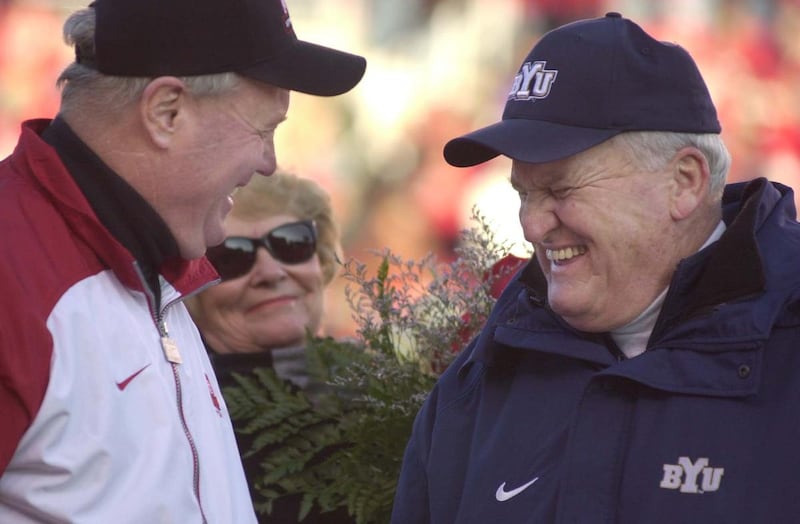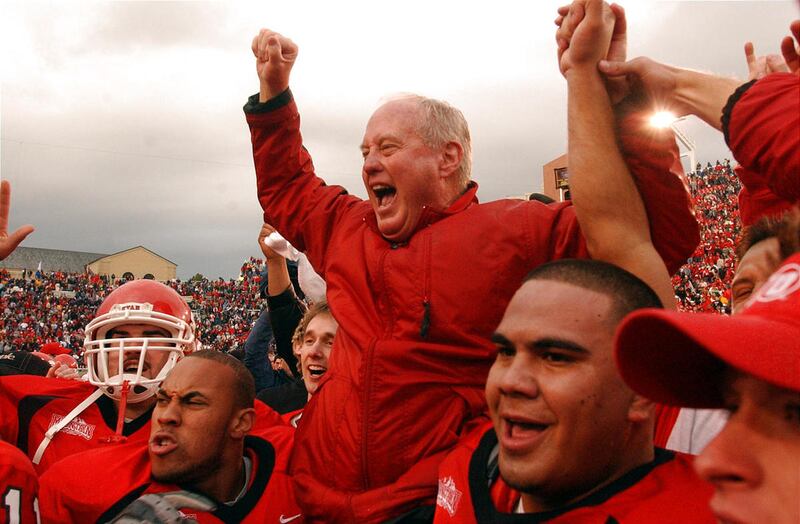It has almost been forgotten that the University of Utah, now a regular top-25 program, was once an average football team, at best. It was that way for decades, and nobody on The Hill seemed to really care, either. There was one man who changed all that.
Ron McBride. If there was no Ronnie Mac, there would have been no Pac-12, no Big 12, no Urban Meyer, no Kyle Whittingham, no unbeaten seasons, no Sugar Bowl or Fiesta Bowl wins, no conference championships. He was the bridge that led to all of that.
And to think he was turned down for the head coaching job twice before he landed it.
“He really put Utah football back on the map,” Whittingham told Yahoo recently. “Coach Mac was responsible for the resurgence of Utah football.”
And that is why Utah will officially induct McBride into its Ring of Honor in Rice-Eccles Stadium on Saturday.
McBride, a career assistant to that point, became Utah’s head coach in 1990 and proceeded to turn it into a winner. He raised the program to a different level. He got things ready for Meyer, who took it up another notch to national prominence, and Whittingham, who kept it there and built on it. Utah has since become a brand name in college football, something that was once unthinkable.
He got things ready for Meyer, who took it up another notch to national prominence, and Whittingham, who kept it there and built on it. Utah has since become a brand name in college football, something that was once unthinkable.
Before Ronnie Mac came along, the Utes were almost perfectly mediocre. It was an uncanny effort of sustained mediocrity. They finished the 1950s with a won-lost record of 54-44-4; they survived the 1960s with a 53-48-1 record; they endured the 1970s with a 44-67 record; they staggered through the 1980s with a 54-57-3 record. After 40 years, they had a cumulative record of 205 wins, 216 losses, eight ties — or an average of 5.1 wins per season. They went through head coaches like office temps — two in the ’50s, three in the ’60s, three in the ’70s, three in the ’80s.
“The bottom line is that (the Utes) are an enigma,” said Utah’s athletic director at the time, Chris Hill. He said this in the fall of 1990 — McBride’s first year.
No one could figure out how a school with the size, location and resources of Utah couldn’t at least play better than .500 football. Not even Jim Fassel, 29-33 in five seasons, could solve the problem, and all he did was go on to take the New York Giants to the Super Bowl after Utah fired him. Wayne Howard, one of Utah’s most successful coaches, once told close friends, “This place is jinxed! It’s impossible to win here. I don’t know what it is.”
So along came Coach Mac, who had been an assistant coach for 25 years at this point and seemed destined to remain such. He applied for Utah’s head coaching job in 1982 and 1985 and was denied both times. He interviewed for the job again in 1990 and was hired. But he was dismayed to discover during the interview process that the Utes were content with mediocrity.
As Mac told the Deseret News in 2011, “The guys who were doing the hiring told me, ‘We just want to be competitive and we don’t want to be embarrassed by BYU. If we just finish in the middle of the conference and we’re respectable, you can stay as long as you want.’ Expectations were not very high. Basketball was carrying things, and football just needed to be respectable.”

Mac’s response: “That’s not the way it’s going to be. We’re going to beat BYU and win championships and go to bowl games.”
In Year 2, Mac’s team won seven games and lost five, marking only the 10th time in 28 years the Utes had a winning record. In Year 3, the Utes went to their first bowl game in three decades. In Year 4, they were 7-6 and played in another bowl game. In Year 5, they were 10-2, ranked eighth in the nation and beat USC in the Freedom Bowl — their first bowl win since 1964.
In 13 seasons, Ronnie Mac’s teams had a record of 88-63, won two conference championships and beat BYU six times. He revived the rivalry, which had seen the Utes lose 16 of the previous 18 games against BYU before he took charge.
Mac was, above all, a master recruiter. The Utes had had only three players taken in the NFL draft in the previous eight years. Under McBride, 21 players were drafted, including future NFL stars Jordan Gross, Jamal Anderson, Luther Elliss, Steve Smith, and Kevin and Andre Dyson.
He was a master recruiter because players loved him. The players loved him because he was warm and humorous and charming and enthusiastic and positive with everyone — fans, coaches, players, administrators. There might be no one who has made more friends in football than Ron McBride.
He disarms everyone; he loves everyone; he makes everyone around him feel good. He has a special bond and rapport with Black and Polynesian people. A non-Latter-day Saint, he was among the first coaches to embrace the missionary program and encouraged Latter-day Saint players to serve missions while also holding their scholarships while they were gone. Almost no one was doing that at the time.
“I wanted to be a positive influence in the LDS community,” he said years ago. “I wanted to support the kids going on missions.”
Mac is a people person and football provided a means to meet and interact with thousands. A native Californian, he began coaching in 1965, and for the next six decades he coached 13 different schools and pro clubs (he served three separate gigs at Utah, which always had a strong pull on him), and that’s not counting all the volunteer jobs and clinics he had along the way.
“I wanted to be a positive influence in the LDS community. I wanted to support the kids going on missions.”
— former Utah coach Ron McBride on recruiting Latter-day Saint players
One month shy of his 86th birthday, he participated in a seven-day clinic for three high schools in Maui this summer. He still trains players in the offseason. As recently as 2022, he was a volunteer assistant at a local high school.
His influence has infused the local college football scene. To wit: the current Utah coaching staff. He hired Whittingham as a defensive coach out of Idaho State. Defensive coordinator Morgan Scalley played for Mac’s teams. He hired offensive coordinator Jason Beck years ago at Weber State. Other Utah assistants also had their beginnings with Mac — Elliss, Lewis Powell, Colton Swan, Sharrieff Shah. Several members of the BYU staff also tie back to Mac.
On Saturday, the U. will ensure that future generations will remember McBride. His name will be placed on the Ring of Honor inside the stadium.
“It’s for the players and the assistants — they created it, they did it,” the coach says. “It’s really something all of them achieved. That name being up there represents the players, the coaches and the people who work up there.”


